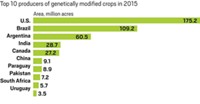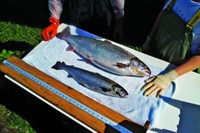Advertisement
Grab your lab coat. Let's get started
Welcome!
Welcome!
Create an account below to get 6 C&EN articles per month, receive newsletters and more - all free.
It seems this is your first time logging in online. Please enter the following information to continue.
As an ACS member you automatically get access to this site. All we need is few more details to create your reading experience.
Not you? Sign in with a different account.
Not you? Sign in with a different account.
ERROR 1
ERROR 1
ERROR 2
ERROR 2
ERROR 2
ERROR 2
ERROR 2
Password and Confirm password must match.
If you have an ACS member number, please enter it here so we can link this account to your membership. (optional)
ERROR 2
ACS values your privacy. By submitting your information, you are gaining access to C&EN and subscribing to our weekly newsletter. We use the information you provide to make your reading experience better, and we will never sell your data to third party members.
Environment
Field Trials of Bioengineered Crops Resurge at USDA
June 7, 2004
| A version of this story appeared in
Volume 82, Issue 23
The number of applications to the government for field trials of crops that have been bioengineered to produce drugs and industrial chemicals has increased greatly over the past year, says a report from the Center for Science in the Public Interest, a nonprofit group. After the ProdiGene incident (C&EN, Nov. 25, 2002, page 6), when corn modified to produce a pig vaccine was accidentally mixed with soybeans, applications for field trials of these bioengineered crops dropped from about 25 annually to only four. In the past 12 months, USDA has received 16 applications and has approved seven to date. So far, little has been revealed about these field trials, CSPI says. Details about the number of acres, the location, and the chemicals produced have been kept secret, the report says. “It is impossible to know whether these biopharmed crops present any food safety or environmental risk, since the whole process is shrouded in secrecy,” says Gregory A. Jaffe, author of the report. USDA has said, however, that most applications are for outdoor field trials of less than 1 acre each involving corn, rice, barley, safflower, mustard, and tobacco and usually are for plants engineered with human genes to produce novel proteins. In response to the CSPI report, USDA announced that it will reveal more data about the trials on its website. The National Food Processors Association is opposed to the use of food crops for the production of drugs and industrial chemicals. The report is available at http://cspinet.org/new/pdf/pharmareport.pdf.





Join the conversation
Contact the reporter
Submit a Letter to the Editor for publication
Engage with us on Twitter